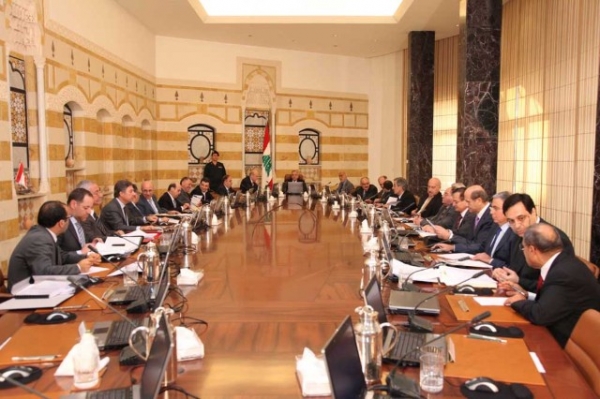Presidency of the Council of Ministers
Presidency of the Council of Ministers before and after the Taif Accord
Prior to the Taif Accord, Article 64 of the Lebanese Constitution stipulated that “the ministers shall run the authorities of the state and be responsible for implementing all rules and regulations related to the affairs falling under their jurisdiction.” Later, the 1990 constitutional amendment came to completely alter the text of Article 64 in accordance with the Taif Accord. The amended article expanded the prerogatives granted to the Prime Minister. Accordingly, he became responsible for executing the general policy that is set by the Council of Ministers, presenting said policy before Parliament, signing, with the President of the Republic, all decrees except the decree which designates him as Prime Minister and that accepting the resignation of the government or considering it as having resigned. As amended by the 1990 Constitutional Law, the Prime Minister shall also call the Council of Ministers into session, lay down its agenda and follow up the activities of administrations and public institutions.
Bodies and Institutions under the Presidency of the Council of Ministers
The Presidency of the Council of Ministers has authority over 30 bodies with jurisdictions in the administrative, judicial, religious and economic areas. These bodies and institutions are:
- Higher Disciplinary Body
- Audit Court
- Civil Service Council
- State Employees’ Cooperative
- National Institute of Administration
- Central Inspection
- Ifta’a Authorities
- Sunni religious courts
- Jaafarite religious courts
- Druze religious courts
- Higher Islamic Shia’a Council
- Al Ifta’a al-Jaafari
- Druze spiritual leadership (Mashyakhat Al Akl)
- Directorate General of the Druze Spiritual Council
- Alawite Islamic Council
- Central Administration of Statistics
- Higher Defense Council General Secretariat
- State Security Directorate General
- Council for Development and Reconstruction
- Central Fund for the Displaced
- Council for South Lebanon
- Social and Economic Council
- National Archives Center
- National Council for Scientific Research
- Higher Relief Committee
- Public Institution for Consumer Markets
- Pilgrim Affairs Authority
Budget of the Presidency of the Council of Ministers
The budget assigned to the Presidency of the Council of Ministers stood in the 1992 Budget Law at LBP 76.2 billion, amounting to 4.6% of the public expenditure. In 2012, its share rose to LBP 1,440 billion, that is 6.83% of expenditure.
Table 1 illustrates the evolution of the budget assigned to the Presidency of the Council of Ministers as compared to the public budget in the past few years:
|
Evolution of the Budget of the Presidency of the Council of Ministers (amounts in LBP billion) |
Table 1 |
||
|
Year |
Budget of the Presidency of the Council of Ministers |
Share of the Public Budget (%) |
|
|
1992 |
76.220 |
4.6 |
|
|
1994 |
419.5 |
10.2 |
|
|
1996 |
605.6 |
9.3 |
|
|
1998 |
472.6 |
6.4 |
|
|
2000 |
590.3 |
6.9 |
|
|
2002 |
732 |
7.8 |
|
|
2004 |
551 |
5.8 |
|
|
2005 |
497 |
5 |
|
|
2007 |
581 |
4.9 |
|
|
2009 |
638.4 |
3.9 |
|
|
2010 |
1,725 |
8.8 |
|
|
2012 |
1,440 |
6.8 |
|
Source: Public Budget Laws between 1993 and 2005/ Public Budget Draft Laws between 2005 and 2012.
Staff of the Directorate General
According to the Law put into force by virtue of Decree no. 10618 issued on August 21, 1975, the Directorate General of the Presidency of the Council of Ministers consists of:
Ministerial Affairs Division
- Department of the Council of Ministers’ Work
- Studies Bureau
- Ministerial Decisions Bureau
- National Archives Bureau
- Department of Joint Ministerial-Parliamentary Affairs
- Department for the Follow-up on the Execution of Ministerial Decisions
Legal Affairs Division
- Administrative Studies Department
- Legal studies Department
Technical Affairs Division
- Technical Affairs Department
Protocol and Public Relations Division
- Prime Minister’s Secretariat Department
- Prime Minister’s Office
- Directorate of Central Archives and National Documents
- Al-Diwan
- Accounting and HR Bureau
- Information and Complaints Bureau
- Administrative Archives Bureau
- Official Gazette Department
- Subscribers’ Bureau
- Editing and Publishing Bureau
- Archives Bureau
There are 115 posts at the Directorate General of the Presidency of the Council of Ministers. They are distributed by grade as follows:
- Grade 1→ 5 posts
- Grade 2→ 7 posts
- Grade 3→25 posts
- Grade 4→51 posts
- Grade 5→27 posts
If we examine the distribution of the spoils of power in Lebanon, a glimpse into the Presidency of the Council of Ministers reveals that the Sunni community receives the biggest chunk of the pie, which puts this entity at equal levels with the Presidency of the Lebanese Republic. Will other sectarian groups accept the vast prerogatives granted to this body or will they demand a more equitable division of functions?








Leave A Comment